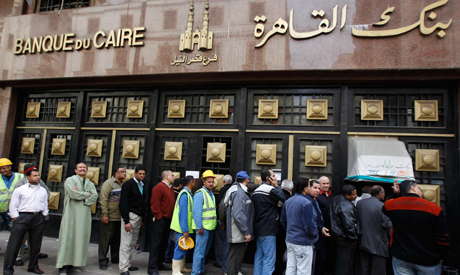
People stand in the line to make withdrawals outside Cairo Bank in downtown Cairo February 6, 2011 (Photo: Reuters)
The Central Bank of Egypt has introduced new restrictions on cash deposits in US dollars, CBE governor Hisham Ramez confirmed on Wednesday.
Individuals and companies will not be able to deposit over $10,000 in a day and $50,000 a month in Egypt's banks, Ramez told talk show host Khairi Ramadan in a phone call aired on a private satellite channel Wednesday evening.
The move is the latest in a fight by the Central Bank to eradicate the country's foreign currency black market, which has gained ground in the past years as authorities protected the pound following the country's January 2011 uprising.
The new restrictions on cash deposits are expected to effectively eradicate the black market by making it impossible for companies to buy large amounts of foreign currency and then depositing them in banks.
"The black market will be eradicated this way because it will not find customers," he explained.
The banks will accept large deposits on a case by case basis, Ramez added, citing hotels needing to deposit cash revenues in dollars as an example.
Egypt has in recent weeks let its local currency steadily drop as it strives to close the gap between the official and black market exchange rates, with the pound currently trading at LE7.53 against the dollar, having lost some 5.5 percent of its value against the dollar since 18 January.
The central bank has been controlling the official exchange rate through regular foreign currency auctions since December 2012.
Last week, the CBE widened the margin at which banks could trade dollars, to from LE0.03 to LE0.10 above or below the official rate in another move to stifle the unofficial market.
The dollar deposit limits also puts Egypt in compliance with international practices against money-laundering, said the governor.
Only 10 percent of the remittances earned by Egyptians working abroad, which last fiscal year amounted to some $18.5 billion a year, are deposited in the banks, says Ramez.
Remittances, along with tourism and revenues from Egypt's Suez Canal, are a main source of much needed foreign currency for Egypt, which imports most of its basic commodities.
Foreign currency reserves in the country's central bank stood at $15.3 billion at the end of December 2014.
Short link: